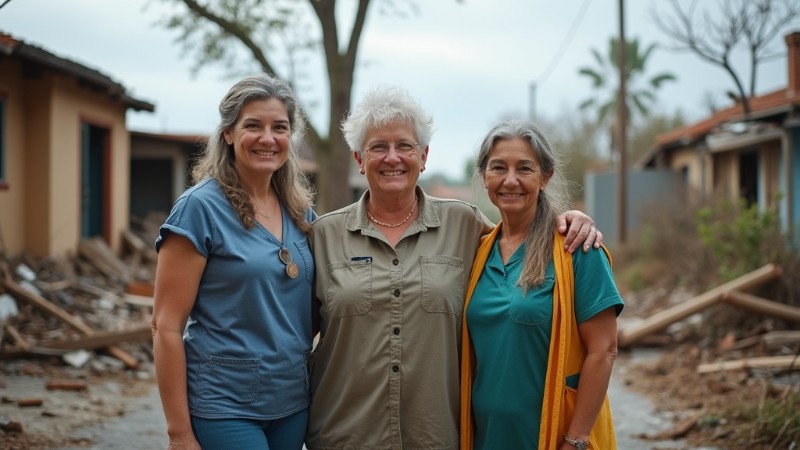As the number of seniors grows in the Midwest, having more care options available becomes crucial. When choosing between in-home care, assisted living, or nursing homes, seniors and their families can face tough decisions. This article looks at the changing world of senior care in the Midwest, highlighting different care models that offer personalized flexibility and support.
Key Takeaways
The Midwest is experiencing an expansion of senior care options, including new trends and opportunities for personalized flexibility and support.
- Growing demand for local senior care services has led to the opening of new assisted living facilities and in-home care providers, such as Griswold franchise locations in Indiana and Ohio.
- Artificial intelligence (AI) is playing a significant role in senior care innovation, with digital tools and chatbots helping seniors and their caregivers access health benefits and services more easily.
- Financial considerations and support options are crucial for families navigating the costs of senior care, with AI tools like DUOS providing personalized help with insurance options and financial aid.
Growing demand for local senior care
The aging baby boomer generation has led to fast-growing demand for senior care services. This is seen strongly in the Midwest, where close-knit communities and a desire for local care options make assisted living and in-home care popular.
Assisted living facilities are designed for seniors who can mostly take care of themselves but need some help, like managing medication, social activities, and having medical resources on-site. On the other hand, in-home care provides tailored support for those who want to stay in their own homes while keeping their independence.
Recently, several Griswold franchise locations have opened in Indiana and Ohio, expanding senior care options. These new locations focus on offering personalized non-medical services, including personal care, companionship, and help around the house. Mike Stutz and Lisa Phelps have opened in South Bend and Elkhart, Indiana, while Rick Hall started a similar service in Dayton, Ohio. Drawing from personal experiences with their own older family members, they’ve created caring solutions that balance home and facility-based care.
The Griswold franchise approach reflects a growing trend among business owners who want to positively impact their communities by meeting the needs of older adults. These initiatives are driven by a sense of purpose and the understanding that senior care services are a rewarding and responsible business opportunity. By focusing on non-medical assistance, the Griswold franchises serve seniors who need help with daily tasks but don’t need constant medical care, thus addressing a vital need in senior care.
AI’s role in senior care innovation
Technology is becoming more important in senior care. Digital tools and artificial intelligence help make health benefits and services easier to access. A 2024 study by DUOS, a digital health company, showed that 60% of people are open to using AI to quickly answer health questions for themselves or aging family members. This suggests that AI can really help seniors and their caregivers deal with care concerns.
Karl Ulfers, the CEO and founder of DUOS, talks about the growing needs of healthcare as more people get older. By 2030, there will be more people over 65 than there are kids under 18, putting strain on the current system for seniors. With fewer workers to help out, technology is stepping up. AI chatbots, like those from DUOS, are proving to be helpful by giving personalized support based on each person’s health needs and insurance.
Financial considerations and support options
For many families, figuring out how to pay for senior care can be one of the toughest challenges. Different types of care like assisted living, in-home care, and nursing homes all have their own costs, and it’s crucial to know what insurance will or won’t cover to make good choices. Assisted living provides housing and care but can be expensive. In 2023, the average cost was over $64,000 a year, which makes it a big concern for many families.
Many people think health insurance or Medicare will pay for assisted living or other long-term care, but that’s not usually the case. Medicare doesn’t cover non-medical care, like help with daily activities such as bathing, dressing, and preparing meals. Private long-term care insurance might help cover some of these costs, depending on your policy. Medicaid can help with some long-term care costs for eligible people, especially in nursing homes, but doesn’t usually cover all the costs of assisted living.
Veterans and their spouses might have extra support through benefits like the VA Aid and Attendance Benefit. This can help cover some of the costs of assisted living, making quality care more affordable for those who qualify. Some states also have programs encouraging people to buy long-term care insurance so they can keep more of their assets while still qualifying for Medicaid support.
New technology, like AI tools, makes it easier for seniors and their families to manage care costs. AI chatbots, like DUOS, help check medical coverage and benefits. These tools give personalized help, making it easier for seniors to understand insurance options and find financial aid for needs like transportation, food, and medical care. According to Karl Ulfers, older adults might skip health services because they think they can’t afford them. AI can help them understand their benefits and make getting care simpler.
In addition, a DUOS survey found that 63% of people feel confused by health care decisions, showing the need for clearer information and guidance. AI tools can help by giving real-time answers using updated information from Medicare and other sources. DUOS uses a method called retrieval-augmented generation to mix AI with health benefit documents, offering seniors easy-to-understand answers. This technology helps make complex insurance details simpler, offering practical information needed for making good choices.
Choosing the right care setting
Choosing the right care for an aging loved one means finding a mix between support and independence. In-home care is a great choice for seniors who want to be in their own houses with some help.
It keeps them in a familiar space, which can be comforting as they face aging challenges. Griswold’s in-home care services, for example, offer everything from companionship to personal care, allowing seniors to feel comfortable and thrive at home.
Assisted living facilities
Assisted living facilities are great for people who need some medical help and structure but don’t need full-time care like in nursing homes. These places have shared spaces for activities, communal dining, and staff available to help with medical and everyday tasks. Many residents love the community feel, as it helps reduce loneliness and offers chances to socialize, which is important for staying mentally and emotionally healthy.
Nursing homes
Nursing homes offer the most complete care, with 24/7 medical help for those who need constant attention. This choice is often best for seniors with complex health issues, like after surgery or dealing with chronic illnesses needing regular care from skilled nurses. While nursing homes provide thorough care, they can also limit personal freedom. It’s important for families to consider their loved ones’ needs and desires before choosing this option.
Final thoughts
The expansion of senior care options in the Midwest is all about giving you more choices and personalized care as you age. New in-home care services, like Griswold, are opening, and many facilities offer a variety of assisted living and nursing home services. This means you and your family have more options than ever before. Plus, AI technology is making it easier to get health benefits and make decisions about care.
Choosing the right option involves thinking about both the emotional and financial sides of care. AI tools, like DUOS, are helping by assisting seniors to understand their healthcare options and stay independent for longer.
Planning ahead is important. By looking into insurance coverage, veteran benefits, community resources, and AI tools, you can make sure your loved ones get the care they need in a supportive environment. By offering more services and focusing on caring, personalized support, Midwest communities are setting a strong example in meeting the needs of their aging population.



